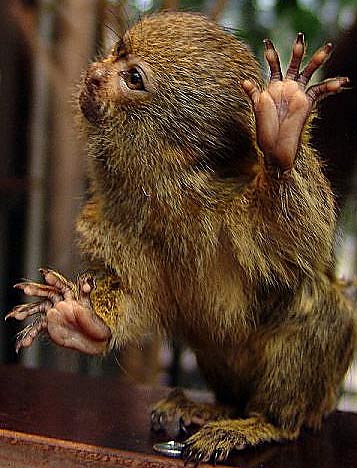Adaptations
Pygmy’s Mouth

Pygmy Marmosets have adapted in form over time to better suit the
environment they live in. Pygmy Marmosets have a unique jaw and mouth that
they use for sucking the sap out of trees, (Rare Species Conservatory
Foundation, 2013) .This includes a high palate that allows them to be better
at feeding. The higher palate gives the pygmy marmoset a better mechanism
for suction, (Townsend, 2001) therefore increasing their food handling
efficiency (energy expended on acquisition of food). Another way the pygmy
marmoset has adapted for feeding is their incisors. Pygmy
Marmosets have long narrow incisors that
 help them gouge large holes out of
the bark of trees to feed on its sap, (PBS, 2013).
help them gouge large holes out of
the bark of trees to feed on its sap, (PBS, 2013).
In addition, the pygmy marmoset uses its long bushy tail to help keep its balance as it jumps though the tree tops. It is unlike the spider monkey that uses its tail as a hand for grasping and holding. On the same hand Pygmy marmosets lack opposable thumbs many primates’ possess. They also have curled nails on each finger to help them latch onto and climb trees, (San Diego Zoo, 2013).
One of the most distinct factors of the pygmy marmoset is of course its size! But how did the pygmy marmoset get so small compared to other monkeys? It has been hypothesized that ancestors of the pygmy marmoset had changed their diet to heavily rely on gum and sap from trees while the other monkeys stuck to insects and fruits. This is what gave the pygmy marmoset over time, their unique jaw and teeth that are designed to taking the sap out of a tree. Over time, however; the pygmy marmoset reduced in body mass and metabolism to get the most out of the sap and gum it was reliant on, (Genoud, Martin, and Glaser, 1997). This strategy of ancestor marmosets is what could have resulted in the world’s smallest monkey!
Next: Reproduction